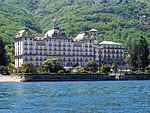Stresa
| Stresa | ||
|---|---|---|
| Comune | ||
| Comune di Stresa | ||
 | ||
| ||
 Stresa | ||
| Coordinates: 45°53′N 8°31′E / 45.883°N 8.517°ECoordinates: 45°53′N 8°31′E / 45.883°N 8.517°E | ||
| Country | Italy | |
| Region | Piedmont | |
| Province | Verbano-Cusio-Ossola (VB) | |
| Frazioni | Brisino, Carciano, Levo, Binda, Passera, Someraro, Vedasco, Magognino, Stropino, Alpino, Mottarone, Isola Bella, Isola Pescatori. | |
| Government | ||
| • Mayor | Canio Di Milia | |
| Area | ||
| • Total | 33 km2 (13 sq mi) | |
| Elevation | 200 m (700 ft) | |
| Population (30 September 2008) | ||
| • Total | 5,155 | |
| • Density | 160/km2 (400/sq mi) | |
| Demonym | Stresiani | |
| Time zone | CET (UTC+1) | |
| • Summer (DST) | CEST (UTC+2) | |
| Postal code | 28838 | |
| Dialing code | 0323 | |
| Patron saint | Ambrose | |
| Website | Official website | |
Stresa is a town and comune of about 5,000 inhabitants on the shores of the Lago (Lake) Maggiore in the region of Piedmont, northern Italy; it is situated on the road and rail routes to the Simplon pass, about 90 km north-west of Milan. Since the early 20th century, the main source of income has been the tourist trade. Like other locations on Lago Maggiore, it benefits from spectacular views as well as areas of historical and architectural interest.
History

The name of this town first appeared in documents in AD 998.
In the 15th century it grew into a fishing community and owed feudal allegiance to the Visconti family. It subsequently came under the control of the Borromeo family.
For centuries Stresa has been a popular retreat for Europe's aristocrats, who have endowed the town with a number of villas. Tourism increased substantially after tunneling of the Simplon Pass allowed train services from north of the Alps to pass through Stresa in 1906.
In 1948 American author and journalist, Ernest Hemingway visited the town. He had set part of his 1929 novel Farewell to Arms in the Grand Hotel des Iles Borromees. In 2002 Stresa hosted the 10th International Hemingway Conference.
Stresa has played host to two notable political conferences in the 20th century:
- 1935: the UK, Italy and France re-affirm the Treaty of Locarno and agree to form the Stresa front to combat and contain Nazi Germany.
- 1958: the foundations of what would become Europe's Common Agricultural Policy of the European Economic Community were formulated in Stresa.
Stresa is also the venue for the "Settimane Musicali"; one of Europe's important classical music international festivals which is held annually in the summer.

Transport
Regular boat services from the town's two docks provide access to the nearby Borromean Islands and a 20 minute cable car ride leads to the summit of Monte Mottarone, with the Giardino Botanico Alpinia en route.
Main sights

- Villa Ducale, commissioned by Giacomo Filippo Bolongaro and dating from about 1770. In 1848 the villa passed to the Italian philosopher Antonio Rosmini-Serbati and today it houses the International Centre for Rosminian Studies.
- Villa Dell'Orto, built in 1900. It was commissioned by the painter Liberto Dell'Orto and designed by Boffi.
- The large Villa Pallavicino, between Stresa and Belgirate. It was the inspiration of Ruggero Bonghi in the 1850s and now is the site of a zoological park.
- The church of S. Ambrogio (restored in Neoclassical style by Giuseppe Zanoia in 1790)

External links
| Wikimedia Commons has media related to Stresa. |
- Official site (Italian)
- Official site (English)
- Home - Stresa Festival - Settimane Musicali di Stresa e del Lago Maggiore (English)
- Tourist Information (English)
- Photo Gallery of Stresa, House and Seasons (English)
- STRESA NEWS - Newspaper on line of Stresa (Italian)
- STRESA PAGES By Stresa.org (English)
| ||||||||||||||||||||||||||

